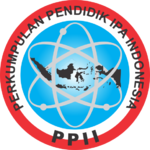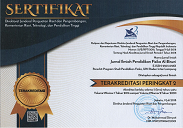Subject specific pedagogy based on discovery learning and volcanic eruption disasters: Does it affect students’ concept mastery?
Abstract
Keywords
Full Text:
PDFReferences
Aberson, C. L. (2019). Applied Power Analysis for the Behavioral Sciences (2nd Edition). Routledge.
Afriana, J., Permanasari, A., & Fitriani, A. (2016). Project-Based Learning Integrated to STEM to Enhance Elementary School’s Students Scientific Literacy. Jurnal Pendidikan IPA Indonesia, 5(2), 261–267. https://doi.org/10.15294/jpii.v5i2.5493
Almukarramah, Fadhillah, & Sudrajat, A. (2013). Integrasi Konsep Kebencanaan dalam Implementasi Kurikulum 2013 di Sekolah Dasar. Jurnal Pendidikan Dasar, 118–130. https://doi.org/doi.org/10.21009/JPD.0102.12
Amri, M. R., Yulianti, G., Yunus, R., Wiguna, S., Adi, A. W., Ichwana, A. N., Randongkir, R. E., & Septian, R. T. (2016). Risiko Bencana Indonesia (R. Jati (ed.)). Badan Nasional Penanggulangan Bencana.
Anazifa, R. D., & Djukri. (2017). Project-Based Learning and Problem-Based Learning: Are They Effective to Improve Students’ Thinking Skills? Jurnal Pendidikan IPA Indonesia, 6(2), 346–355. https://doi.org/10.15294/jpii.v6i2.11100
Arnold, J. C. (2018). An Integrated Model of Decision-Making in Health Contexts: The Role of Science Education in Health Education. International Journal of Science Education, 1–19. https://doi.org/10.1080/09500693.2018.1434721
Azwar, S. (2015). Metode Penelitian. Pustaka Pelajar.
Belton, D. J. (2016). Teaching Process Simulation Using Video-Enhanced and Discovery/Inquiry-Based Learning: Methodology and Analysis Within a Theoretical Framework for Skill Acquisition. Journal Education for Chemical Engineers, 17(2002), 54–64. https://doi.org/10.1016/j.ece.2016.08.003
Chen, D. G., & Peace, K. E. (2013). Applied Meta-Analysis with R. CRC Press.
Cumming, G. (2012). Understanding the New Statistic Effect Sizes: Confidence, Intervals, and Meta-Analysis. Routledge.
Djamarah, S. B., & Zain, A. (2013). Strategi Belajar Mengajar. Rineka Cipta.
Dong, M. (2020). Structural Relationship Between Learners’ Perceptions of a Test, Learning Practices, and Learning Outcomes: A Study on The Washback Mechanism of a High-Stakes Test. Journal of Studies in Educational Evaluation, 64(October 2019), 100824. https://doi.org/10.1016/j.stueduc.2019.100824
Ertikanto, C., Rosidin, U., Distrik, I. W., Yuberti, & Rahayu, T. (2018). Comparison of Mathematical Representation Skill and Science Learning Result in Classes with Problem-Based and Discovery Learning Model. Jurnal Pendidikan IPA Indonesia, 7(1), 106–113. https://doi.org/10.15294/jpii.v6i2.9512
Green, S. B., & Salkind, N. J. (2003). Using SPSS for Windows and Macintosh: Analyzing and Understanding Data (3rd Editio). Prentice Hall Inc.
Großmann, N., & Wilde, M. (2019). Experimentation in Biology Lessons: Guided Discovery Through Incremental Scaffolds. International Journal of Science Education, 1–23. https://doi.org/10.1080/09500693.2019.1579392
Guzey, S. S., & Ring-whalen, E. A. (2018). Negotiating Science and Engineering: An Exploratory Case Study of a Reform-Minded Science Teacher. International Journal of Science Education, 1–19. https://doi.org/10.1080/09500693.2018.1445310
Hairida. (2016). The Effectiveness Using Inquiry-Based Natural Science Module with Authentic Assessment to Improve the Critical Thinking and Inquiry Skills of Junior High School Students. Jurnal Pendidikan IPA Indonesia, 5(2), 209–215. https://doi.org/10.15294/jpii.v5i2.7681
Hanafi. (2016). The Effect of Discovery Learning Method Application on Increasing Students ’ Listening Outcome and Social Attitude. Jurnal Dinamika Ilmu, 16(2), 291–306.
Hartati, T. (2016). PCK (Pedagogical Content Knowledge) bagi Mahasiswa S-2 Pendidikan Dasar dalam Rangka Implementasi Kurikulum 2013. Jurnal Pendidikan Sains Sosial Dan Kemanusiaan, 9(1), 173–182.
Hayudityas, B. (2020). Pentingnya Penerapan Pendidikan Mitigasi Bencana di Sekolah untuk Mengetahui Kesiapsiagaan Peserta Didik. Jurnal Edukasi Nonformal, 1(2), 94–102.
Hidayati, D. (2012). Striving to Reduce Disaster Risk: Vulnerable Communities with Low Levels of Preparedness in Indonesia. Journal of Disaster Research, 7(1).
Hirsh-pasek, K., Zosh, J. M., Golinkoff, R. M., Gray, J. H., Robb, M. B., & Kaufman, J. (2015). Putting Education in “Educational” Apps: Lessons From the Science of Learning. Journal of Psychological Science in the Public Interest, 16(1), 3–34. https://doi.org/10.1177/1529100615569721
Karpen, S. C., & Welch, A. C. (2016). Assessing The Inter-Rater Reliability and Accuracy of Pharmacy Faculty’s Bloom’s Taxonomy Classifications. Journal of Currents in Pharmacy Teaching and Learning, 8(6), 885–888. https://doi.org/https://doi.org/10.1016/j.cptl.2016.08.003
Kenny, C. (2012). Disaster Risk Reduction in Developing Countries: Cost, Benefits, and Institutions. Journal Compilation of Disasters, 36(4), 559–588.
Koehler, M. J., & Mishra, P. (2009). What s Technological Pedagogical Content Knowledge? Journal Contemporary Issues in Technology and Teacher Education, 9(1), 60–70.
Kumullah, R., Djatmika, E. T., & Yuliati, L. (2018). Kemampuan Berpikir Kritis dan Penguasaan Konsep Siswa dengan Problem Based Learning pada Materi Sifat Cahaya. Jurnal Pendidikan: Teori, Penelitian, Dan Pengembangan, 3(12), 1583–1586. https://doi.org/DOAJ-SHERPA/RoMEO-Google Scholar-IPI
Kusmawati, A. (2017). Pengembangan SSP Biologi Domain Kreativitas untuk Meningkatkan Karakter Kreatif, Tanggung Jawab, dan Prestasi Belajar Siswa. Jurnal Inovasi Pendidikan IPA, 3(1), 12–21.
Labibah, U. N., Wilujeng, I., Sulaiman, S., & Rahmawati, L. (2019). Android-Based Physics Learning Media Integrated Landslide Disaster. Jurnal Ilmiah Pendidikan Fisika Al Biruni, 8(October), 233–240. https://doi.org/10.24042/jipfalbiruni.v0i0.4695
Lee, C. J., & Kim, C. M. (2014). An Implementation Study of a TPACK Based Instructional Design Model in a Technology Integration Course. Journal of Education Technology Research Development, 62, 437–460. https://doi.org/10.1007/s11423-014-9335-8
Leech, N. L., Barrett, K. C., & Morgan, G. A. (2005). SPSS for Intermediate Statistics (2nd Edition (ed.)). Lawrence Erlbaum Associates.
Limbong, C., Rohadi, N., & Hamdani, D. (2019). Meningkatkan Motivasi Belajar dan Penguasaan Konsep dengan Model Pembelajaran Siklus Belajar Tipe 5E di Kelas X IPA 3 SMA N 9 Kota Bengkulu. Jurnal Kumparan Fisika, 2(1), 33–40. https://doi.org/e-ISSN: 2655-1403
Lin, T. C., Tsai, C. Ch., Chai, C. S., & Lee, M. H. (2013). Identifying Science Teachers Perceptions of Technological Pedagogical and Content Knowledge (TPACK). Journal Science Education Technology, 22, 325–336. https://doi.org/10.1007/s10956-012-9396-6
Marlina, Utaya, S., & Yuliati, L. (2017). Pengaruh Authentic Problem Based Learning (aPBL) terhadap Penguasaan Konsep IPA Siswa Kelas IV Sekolah Dasar. Jurnal Pendidikan: Teori, Penelitian, Dan Pengembangan, 2(11), 1509–1514.
Mukti, Y. P., Masykuri, M., Sunarno, W., Rosyida, U. N., Jamain, Z., & Dananjoyo, M. D. (2020). Exploring the Impact of Project-Based Learning and Discovery Learning to The Students ’ Learning Outcomes : Reviewed from The Analytical Skills. Jurnal Ilmiah Pendidikan Fisika Al Biruni, 9(1), 121–131. https://doi.org/10.24042/jipfalbiruni.v9i1.4561
Nevid, J. S., & Gordon, A. J. (2018). Integrated Learning Systems: Is There a Learning Benefit? Journal Teaching of Psychology, 45(4), 340–345. https://doi.org/10.1177/0098628318796920
Norton, J., & Gibson, T. D. (2019). Introduction to Disaster Prevention: Doing it Differently by Rethinking the Nature of Knowledge and Learning. Disaster Prevention and Management: An International Journal, 28(1), 2–5. https://doi.org/10.1108/DPM-02-2019-323
Noviyani, M., Kusairi, S., & Amin, M. (2017). Penguasaan Konsep dan Kemampuan Berargumentasi Siswa SMP pada Pembelajaran IPA dengan Inkuiri Berbasis Argumen. Jurnal Pendidikan: Teori, Penelitian, Dan Pengembangan, 2(7), 974–978. https://doi.org/ESSN: 2502-471X
Nurgiyantoro, B., Gunawan, & Marzuki. (2015). Statistik Terapan untuk Penelitian Ilmu Sosial. Gadjah Mada University Press.
Pandey, C. L. (2018). Making Communities Disaster Resilient: Challenges and Prospects for Community Engagement in Nepal. Disaster Prevention and Management: An International Journal. https://doi.org/10.1108/DPM-05-2018-0156
Perkasa, M., & Aznam, N. (2016). Pengembangan SSP Kimia Berbasis Pendidikan Berkelanjutan untuk Meningkatkan Literasi Kimia dan Kesadaran terhadap Lingkungan. Jurnal Inovasi Pendidikan IPA, 2(1), 46–57.
Prasetyo, Z. K. (2011). Pengembangan Perangkat Pembelajaran Sains Terpadu untuk Meningkatkan Kognitif, Keterampilan Proses, Kreativitas, serta Menerapkan Konsep Ilmiah Peserta Didik SMP.
Puspitasari, A., & Handziko, R. C. (2018). Pengembangan LKPD Mobile Learning Guided Discovery untuk Meningkatkan Penguasaan Kompetensi Dasar Ekosistem Kurikulum 2013. Jurnal Inovasi Pendidikan IPA, 4(1), 83–97. https://doi.org/http://dx.doi.org/10.21831/jipi.v4i1.17003
Radhmehr, F., & Drake, M. (2018). An Assessment Based Model for Exploring the Solving of Mathematical Problems: Utilizing Revised Bloom’s Taxonomy and Facets of Metacognition. Journal of Studies in Educational Evaluation, 59, 41–51. https://doi.org/https://doi.org/10.1016/j.stueduc.2018.02.004
Rahayu, N. (2017). Pengaruh Pembelajaran dengan Pendekatan Inquiry terhadap Penguasaan Konsep dan Scientific Skill Materi Sistem Pencernaan. Jurnal Inovasi Pendidikan IPA, 3(1), 70–77.
Rahmawati, I., Hidayat, A., & Rahayu, S. (2016). Peguasaan Konsep IPA Siswa SMP pada Materi Tekanan pada Zat Cair dan Aplikasinya. Jurnal Pendidikan Sains, 4(3), 102–112.
Riezqia, R., Rahardini, B., Putu, I. G., & Wilujeng, I. (2017). The Effect of Science Learning Integrated with Local Potential to Improve Science Process Skills. The 4th International Conference on Research, Implementation, and Education of Mathematics and Science (4th ICRIEMS), 080008(August). https://doi.org/10.1063/1.4995192
Rusman. (2016). Model-Model Pembelajaran: Mengembangan Profesionalisme Guru. PT Raja Grafindo Persada.
Sadeka, S., Mohamad, M. S., & Sarkar, M. S. K. (2020). Disaster Experiences and Preparedness of the Orang Asli Families in Tasik Chini of Malaysia: A Conceptual Framework Towards Building Disaster Resilient Community. Journal of Progress in Disaster Science, 6. https://doi.org/https://doi.org/10.1016/j.pdisas.2020.100070
Saehana, S., Rosnaeni, & Muslimin. (2018). Perbandingan Keterampilan Proses Sains antara Kelompok Siswa yang diajar dengan Model POE dan Model Discovery. Jurnal Pendidikan Fisika, 6(1), 43–53.
Sangkala, M. S., & Gerdtz, M. F. (2018). Disaster Preparedness and Learning Needs Among Community Health Nurse Coordinators in South Sulawesi Indonesia. Journal of Australasian Emergency Care, 21(1), 23–30. https://doi.org/https://doi.org/10.1016/j.auec.2017.11.002
Schijndel, T. J. P. Van, Jansen, B. R. J., & Raijmakers, M. E. J. (2018). Do Individual Differences in Children’s Curiosity Relate to Their Inquiry-Based Learning ? International Journal of Science Education, 1–20. https://doi.org/10.1080/09500693.2018.1460772
Setiawan, B., Innatesari, D. K., Sabtiawan, W. B., & Sudarmin. (2017). The Development of Local Wisdom Based Natural Science Module to Improve Science Literation of Students. Jurnal Pendidikan IPA Indonesia, 6(1), 49–54. https://doi.org/10.15294/jpii.v6i1.9595
Setiawati, I. K., Rusilowati, A., & Khumaedi. (2013). Pembuatan Buku Cerita IPA yang Mengintegrasikan Materi Kebencanaan Alam untuk Meningkatkan Literasi Membaca dan Pembentukan Karakter. Jurnal Pendidikan IPA Indonesia, 2(2), 129–135.
Setyawarno, D. (2016). Panduan Statistik Terapan Untuk Penelitian Pendidikan. FMIPA UNY.
Stave, K. A., Beck, A., & Galvan, C. (2015). Improving Learners’ Understanding of Environmental Accumulations Through Simulation. Journal of Simulation & Gaming, 46(3–4), 270–292. https://doi.org/10.1177/1046878114531764
Sugiyono. (2012). Metode Penelitian Pendidikan Pendekatan Kuantitatif, Kualitatif, dan R&D. Alfabeta.
Sugiyono. (2015). Metode Penelitian dan Pengembangan (S. Y. Suryandari (ed.)). Alfabeta.
Sunal, D. W., & Emmett L Wright. (2019). Physics Teaching and Learning: Challenging the Paradigm. Information Age Publishing Inc.
Syaban, M. F., & Wilujeng, I. (2016). Pengembangan SSP Zat dan Energi Berbasis Keunggulan Lokal untuk Meningkatkan Literasi Sains dan Kepedulian Lingkungan. Jurnal Inovasi Pendidikan IPA, 2(1), 66–75. https://doi.org/http://dx.doi.org/10.21831/jipi.v2i1.8369
Syah, M. (2013). Psikologi Pendidikan dengan Pendekatan Baru. PT Remaja Rosdakarya.
Syar, N. I. (2017). Penggunaan Bahan Ajar IPA Terpadu dengan Tema Cuaca untuk Meningkatkan Penguasaan Konsep Siwa. Jurnal Edusains, 9(1), 34–40. https://doi.org/CC-BY-SA, p-ISSN 1979-7281 e-ISSN 2443-1281
Tahmidaten, L., & Krismanto, W. (2019). Implementasi Pendidikan Kebencanaan di Indonesia (Sebuah Studi Pustaka tentang Problematika dan Solusinya). Lectura: Jurnal Pendidikan, 10(2), 136–154.
Turkka, J., Haatainen, O., & Aksela, M. (2017). Integrating Art into Science Education: A Survey of Science Teachers’ Practices. International Journal of Science Education, 1–17. https://doi.org/10.1080/09500693.2017.1333656
Tyas, R. A., Wilujeng, I., & Suyanta, S. (2020). Pengaruh Pembelajaran IPA Berbasis Discovery Learning Terintegrasi Jajanan Lokal Daerah Terhadap Keterampilan Proses Sains. Jurnal Inovasi Pendidikan IPA, 6(1), 114–125. https://doi.org/https://doi.org/10.21831/jipi.v6i1.28459
van Alten, D. C. D., Phielix, C., Janssen, J., & Kester, L. (2019). Effects of Flipping the Classroom on Learning Outcomes and Satisfaction: A Meta Analysis. Journal of Educational Research Review, 28(November 2018), 1–18. https://doi.org/10.1016/j.edurev.2019.05.003
Verstappen, H. T. (2013). Garis Besar Geomorfologi Indonesia (Suratman (ed.)). Gadjah Mada University Press.
Wang, J., Wei, W., Ding, L., & Li, J. (2016). Method for Analyzing The Knowledge Collaboration Effect of R&D Project Teams Based on Bloom’s Taxonomy. Journal of Computers & Industrial Engineering. https://doi.org/https://doi.org/10.1016/j.cie.2016.11.010
Warner, R. M. (2013). Applied Statistics: From Bivariate Through Multivariate Techniques. Sage Publication.
Wati, A., Susilo, H., & Sutopo. (2018). Pengaruh Pembelajaran Inkuiri Terbimbing Berbantuan Jurnal Belajar terhadap Penguasaan Konsep IPA Siswa. Jurnal Pendidikan: Teori, Penelitian, Dan Pengembangan, 3(1), 129–133.
Widjanarko, M., & Minnafiah, U. (2018). Pengaruh Pendidikan Bencana pada Perilaku Kesiapsiagaan Siswa. Jurnal Ecopsy, 5(17), 1–7.
Yahaya, J. M., Nurulazam, A., & Karpudewan, M. (2016). College Students’ Attitudes Towards Sexually Themed Science Content: A Socioscientific Issues Approach to Resolution. International Journal of Science Education, 38(7), 1174–1196. https://doi.org/10.1080/09500693.2016.1174349
DOI: http://dx.doi.org/10.24042/jipfalbiruni.v9i2.6867
Refbacks
- There are currently no refbacks.

Jurnal ilmiah pendidikan fisika Al-Biruni is licensed under a Creative Commons Attribution-ShareAlike 4.0 International License.
![]()







